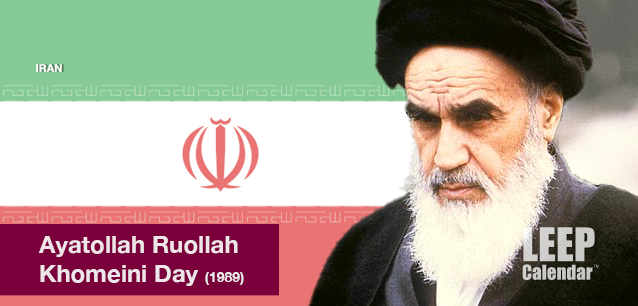 AD
AD
Today is: November 01
Scroll to explore events active on this date.
Additional Events on LEEP
LEEP INK FEATURES

August? Absolutely!
In August, we live through the Dog Days of Summer. It's hot and often humid, and those who can leave for better climates do. Down south, winter is in full force. August is also known as "the ...

In The Heat of July: July 2025 Events
Is it hot enough (or cold enough if you're below the equator) for you yet? There is actually a day for that! Like every month, I pick a diverse collection of events you may or may not know about. This ...

May Blooms: Events in May 2025
Along with October, May is one of the most densely packed months of the year. It's before the summer humidity and the last whole month of the school year. The weather is warming in t...
About Ayatollah Ruollah Khomeini Day
Muslim , Middle East/West Asia
Ends: Jun 03, 2025
DESCRIPTION:
Ayatollah Ruhollah Khomeini Day is a national holiday in Iran and marks the cleric's death on June 3, 1989.
Ayatollah Ruhollah Khomeini was an influential Shiite Muslim cleric and political leader who was pivotal in the 1979 Iranian Revolution, transforming Iran into an Islamic republic. Born on September 24, 1902, in Khomeyn, Iran, Khomeini embarked on his religious education from an early age, rising through the clerical ranks to become a leading figure in the Shiite community.
As an Ayatollah, a high-ranking title in Shiite Islam, Khomeini became a critic of Shah Mohammad Reza Pahlavi's regime, particularly his modernizing efforts in the 1960s, which Khomeini saw as a deviation from Islamic principles. This opposition led to his exile in 1964, first to Turkey, then Iraq, and finally to France.
During his exile, Khomeini propagated his vision of an Islamic state led by a supreme religious leader, or "Velayat-e-Faqih," via sermons and writings. His influence grew, and his resistance messages against Pahlavi's regime became increasingly popular, gaining him a vast following among Iranians disillusioned with Pahlavi's authoritarian rule.
In 1979, the growing discontent culminated in the Iranian Revolution. As the Pahlavi's regime crumbled, Khomeini returned to Iran amidst public euphoria, effectively taking control of the government. He oversaw the drafting of a new constitution, establishing the Islamic Republic of Iran. Theocratic and unapologetically anti-Western, this new state embodied Khomeini's vision, with him as the Supreme Leader.
Khomeini's leadership embraced a conservative interpretation of Islamic law, widespread political repression, and conflict with the West, most notably the hostage crisis at the US embassy in Tehran. However, his policies also included land redistribution, expansion of social services, and women's education.
Internationally, Khomeini's leadership and the Iranian Revolution inspired Islamic revivalist movements and anti-imperialistic sentiments in the Middle East. Despite international isolation, Khomeini remained defiant and emphasized self-sufficiency.
He continued as Iran's Supreme Leader until his death on June 3, 1989. Despite his controversial legacy, Khomeini's influence on Iran and the wider Islamic world is undeniable. His blend of political and religious leadership remains the defining characteristic of Iran's political system. His life and leadership marked a seismic shift in the region's politics, religion, and relations with the West.
VIDEOS
Currently, this event does not have supporting videos.
SUPPORTING DOCUMENTS
Currently, this event does not have supporting documents.
ADDITIONAL IMAGES
Currently, this event does not have supporting images.
Where would you like to go now?
 AD
AD


/footer-logo.svg)
